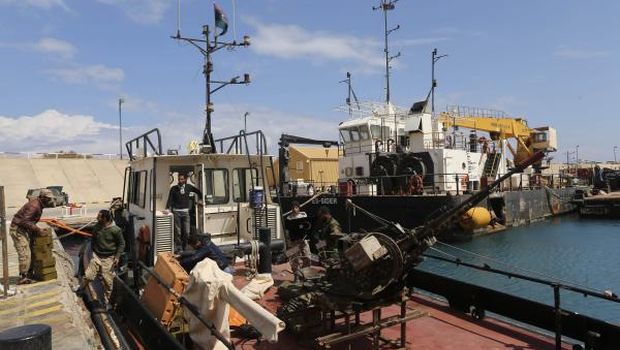
Rebels under Ibrahim Jadhran unload ammunition from a boat at the Sidra port in Ras Lanuf on March 11, 2014. (Reuters/Esam Omran Al-Fetori)
Cairo, Asharq Al-Awsat—The UN Security Council on Wednesday adopted a resolution imposing sanctions on illegal oil exports from Libya, including authorizing the boarding and searching of oil tankers suspected of carrying oil from rebel-held ports in Libya.
The move comes after US Navy SEALS boarded the North Korea flagged oil tanker, the Morning Glory, in international waters southeast of Cyprus earlier this week. The Morning Glory had evaded a Libyan naval blockade at the eastern port of Sidra after being loaded with a reported 234,000 barrels of crude oil from the rebel-held port. The crisis surrounding the Morning Glory has already sparked a political crisis in the post-revolutionary country, leading to the sacking of embattled Prime Minister Ali Zeidan.
UN Security Council resolution 2146 explicitly “condemns attempts to illicitly export crude oil from Libya.” It also authorizes states to inspect vessels suspected of carrying illegally exported oil from Libya, giving states that confront a suspected rebel oil tanker the right “to carry out inspections and direct the vessel to take appropriate actions to return the crude oil, with the consent of and in co-ordination with the Government of Libya, to Libya.” The crude oil seized on the Morning Glory is expected to be returned to the Libyan authorities in accordance with these provisions.
The resolution also gives the sanctions committee the authority to blacklist any vessel that attempts to illegally transport Libyan crude oil, with blacklisted vessels being temporarily barred from international commerce.
In a statement, US Ambassador to the UN Samantha Power called on member states to implement the resolution as soon as possible in order “to deter the actions of those who seek to steal Libyan oil.”
Well-informed Libyan sources speaking to Asharq Al-Awsat on the condition of anonymity said that “this decision was taken based on a request by the Libyan authorities to put an end to attempts by Ibrahim Al-Jadhran, leader of armed militias in Brega which occupy oil fields and terminals east of the country, to export oil illicitly and against the will of the Libyan state.”
Ibrahim Al-Dabashi, Libya’s UN envoy, said via Facebook that states where these oil tankers are registered must work to stop any illegal transport or shipping of Libyan crude oil in coordination with the relevant Libyan authorities.
Jadhran, the leader of the rebels in Brega, issued a strongly-worded speech on Tuesday dismissing any chances of reaching a peaceful settlement with the Libyan government to end the siege of three ports. Jadhran said his group “will continue to fight for their rights to aspire for a better future for our sons and families.”
The rebels are demanding autonomy and a greater share of Libya’s oil revenue, and have called on the UN and the Arab League to intervene to help the people of eastern Libya.
Jadhran, who is based in Ajdabiya, defended his actions in superseding the Libyan authorities and selling oil directly, claiming that the majority of Libya’s eastern tribes agree on the importance of taking control of their resources in the interest of the people.
The central government has given Jadhran’s men a deadline of two weeks to vacate the ports or face military action to end the siege which has paralyzed the country’s finances. The eight-month fight for control of Libya’s oil trade has disrupted crude exports, which is the main source of national revenue.
UN Secretary-General Ban Ki-moon telephoned the president of Libya’s General National Congress on Wednesday to reiterate international support for the political process in Libya. The UN resolution on Wednesday reaffirmed the UN’s “strong commitment to the sovereignty, independence, territorial integrity and national unity of Libya,” confirming “the primary responsibility of the Libyan authorities in taking appropriate action to prevent the illicit export of crude oil from Libya.”
